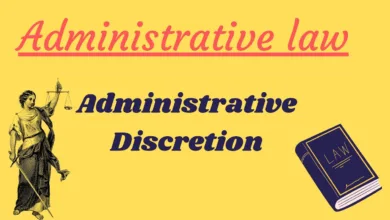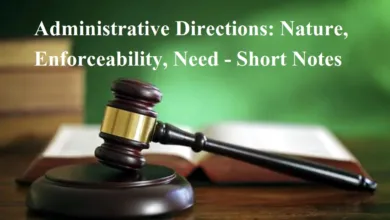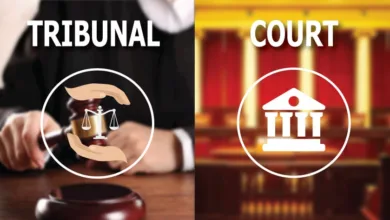Judicial Control of Administrative Discretion- Delegation of Discretion
Judicial Control of Administrative Discretion- Delegation of Discretion
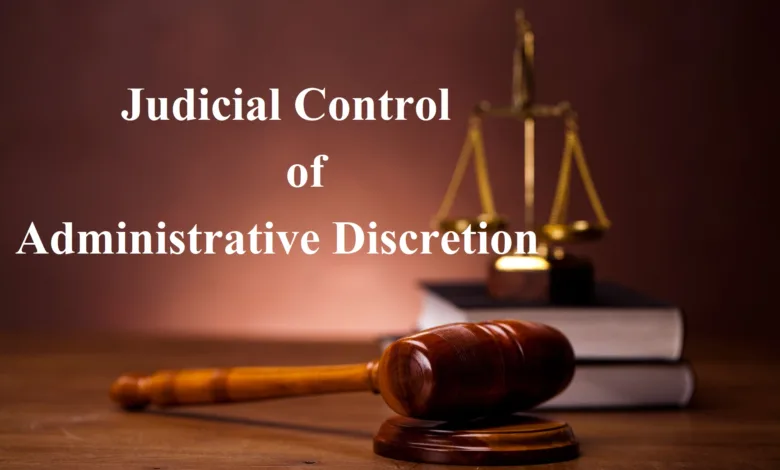
We are going to discover the essence of administrative discretion and its judicial oversight, exploring its necessity, control mechanisms, and the role of courts in ensuring accountable governance.
Understanding Administrative Discretion
Discretion means the liberty to act according to one’s pleasure, or at one’s own will.
Administrative discretion refers to the freedom given to government officials to make decisions based on their judgment. In modern democracies, it’s common for governments to grant such powers to officials. However, to prevent misuse of this authority, there needs to be oversight.
Justice Douglas once stated“where discretion is absolute, man has always suffered…Absolute discretion…is more destructive of freedom than any of man’s other inventions.”
NEED OF ADMINISTRATIVE DISCRETION
Governments rely on administrative discretion to handle various tasks efficiently. For instance, in providing services like education, healthcare, and social welfare, there are countless details that can’t be covered by laws alone. This is where discretion comes in handy.
In the words of Prof. H. W.R. Wade,
“If the state is to care for its citizens from the cradle to the grave, to protect their environment, to educate them at all stages, to provide them with employment, training, houses, medical services, pensions and in the last resort food, clothing and shelter, it needs a huge administrative apparatus. Relatively little can be done by merely passing Acts of Parliament and leaving it to the courts to enforce them. There are far too many problems of detail and far too many matters which cannot be decided in advance. No one may erect a building without planning permission, but no system of general rules can prescribe for every case. There must be discretionary power.”
Judicial Control of Administrative Discretion
To ensure fair use of administrative discretion, there must be checks and balances. While India’s Constitution doesn’t follow the strict separation of powers like the U.S., there’s still a general division between legislative, administrative, and judicial functions.
There are various grounds on which the judiciary will have to intervene in the exercise of discretionary power for judicial control administrative discretion. These grounds include:
| Daily current affairs Updates | Click Here |
| Law Notes Free Channel | Click Here |
(i) Abuse of discretionary power: When discretionary power is conferred on authority, it must be exercised following the law. As Markose put it, “When the mode of exercising a valid power is improper or unreasonable, there is an abuse of power.” There are certain circumstances from which abuse or excess of discretionary power can be inferred. These may be acting without jurisdiction, exceeding jurisdiction, an arbitrary action, mala fide actions, improper motive, unreasonableness, non-observance of principles of natural justice, etc.
(ii) Non-exercise of discretion: judicial control administrative discretion, as non-exercise of discretion arises either
(a) When the authority delegates his power to a subordinate without any statutory authority, or
(b) When someone acts under dictation from superiors without any statutory authority.
The proper test of deciding whether a delegation is valid or not is to see if the authority who delegates had the power to so delegate. If they did, then the action is valid and justified, but if they did not, the action should be invalid and unlawful.
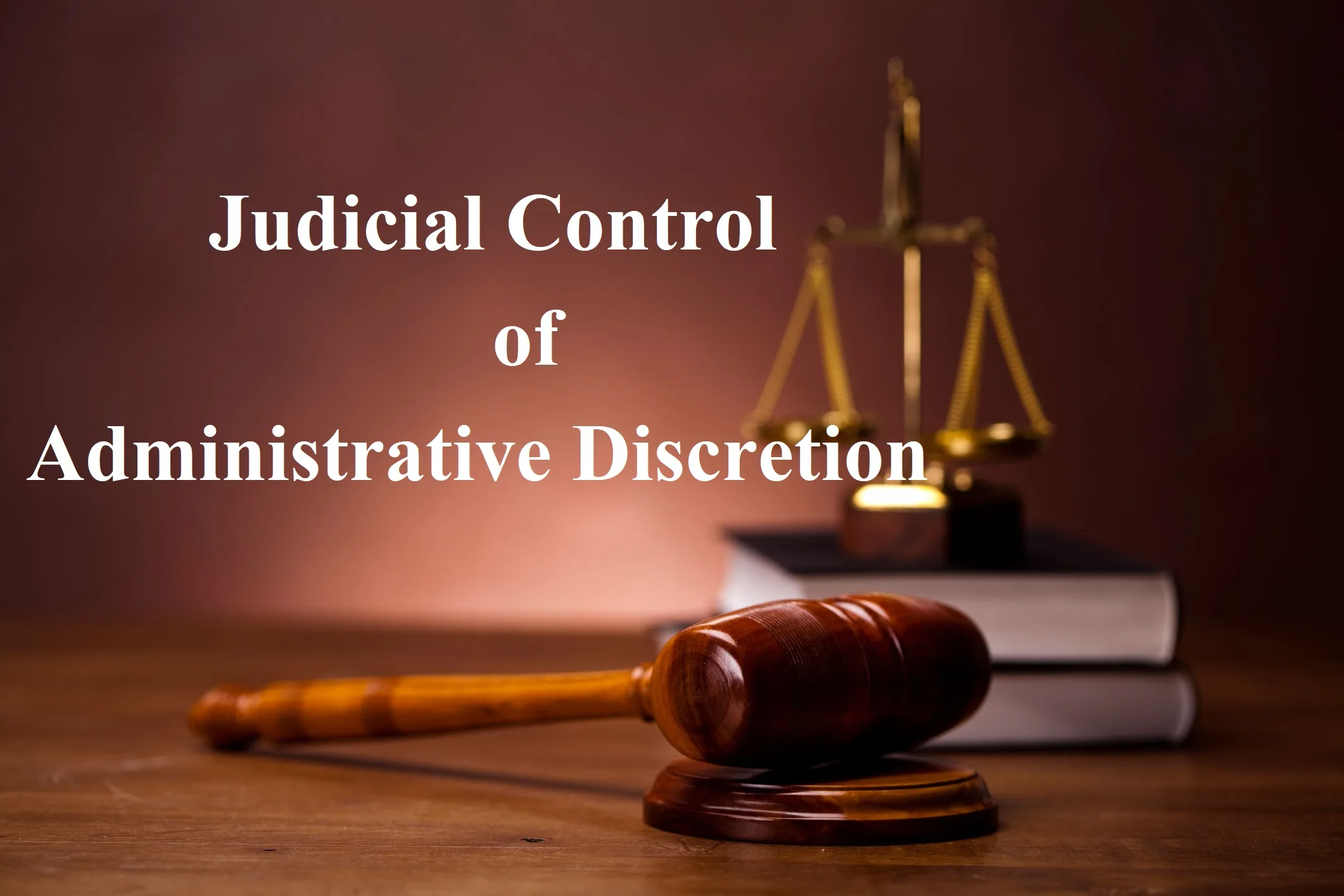
Judicial Control of Delegation
- When a statute grants discretionary power to an administrative authority without explicitly allowing delegation, only that authority can exercise the discretion. Delegating this power further to another person or entity goes against the principle of “delegatus non potest delegare” (a delegate cannot delegate).
- In the case of Vine v. National Dock Labour Board, the House of Lords invalidated the dismissal of a dock worker because the Dock Labour Board, to whom the power was given, had passed the decision to a disciplinary committee instead of deciding it themselves.
Invalidity of Delegated Legislation
- Ultra Vires Enabling Act: If a law contradicts the constitution, it’s considered “ultra vires.” This may challenge the legislature’s authority to enact such laws or serve as a check on their powers. There are limits to delegation, and essential legislative powers cannot be delegated.
- Violation of Constitutional Provisions: Sometimes, the enabling act might not violate the constitution, but the subordinate legislation does. The same principles used to assess the constitutionality of laws directly from the parliament apply to subordinate laws. If a rule under the enabling act breaches constitutional provisions, only that rule is invalidated, not the entire act.
- Ultra Vires of Delegating Act: Delegated powers must align with the terms set by the legislature. If the rules exceed the scope of authority granted by the legislature, they can be challenged as ultra vires. Subordinate delegation should not contradict or conflict with the delegating act.
By understanding these principles, we ensure that administrative discretion serves the public interest without undermining democratic principles.
FAQs:
What is Administrative Discretion?
Administrative discretion refers to the freedom given to government officials to make decisions based on their judgment. In modern democracies, it’s common for governments to grant such powers to officials.
What is NEED OF ADMINISTRATIVE DISCRETION?
Governments rely on administrative discretion to handle various tasks efficiently. For instance, in providing services like education, healthcare, and social welfare, there are countless details that can’t be covered by laws alone.
Judicial Control of Administrative Discretion
There are various grounds on which the judiciary will have to intervene in the exercise of discretionary power for judicial control administrative discretion.
(i) Abuse of discretionary power
(ii) Non-exercise of discretion

